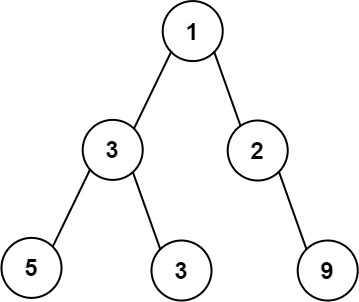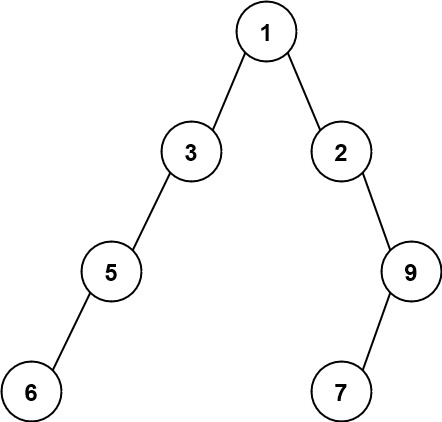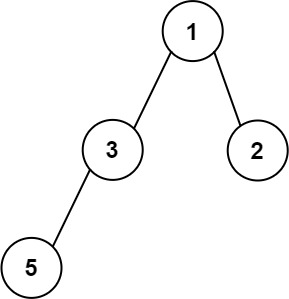
Maximum Width of Binary Tree
20 April, 2023
1
1
0
Contributors
Problem Statement:-
Given the root of a binary tree, return the maximum width of the given tree.
The maximum width of a tree is the maximum width among all levels.
The width of one level is defined as the length between the end-nodes (the leftmost and rightmost non-null nodes), where the null nodes between the end-nodes that would be present in a complete binary tree extending down to that level are also counted into the length calculation.
It is guaranteed that the answer will in the range of a 32-bit signed integer.
Link: https://leetcode.com/problems/maximum-width-of-binary-tree/description/
Problem Explanation with examples:-
Example 1

Input: root = [1,3,2,5,3,null,9]
Output: 4
Explanation: The maximum width exists in the third level with length 4 (5,3,null,9).Example 2

Input: root = [1,3,2,5,null,null,9,6,null,7]
Output: 7
Explanation: The maximum width exists in the fourth level with length 7 (6,null,null,null,null,null,7).Example 3

Input: root = [1,3,2,5]
Output: 2
Explanation: The maximum width exists in the second level with length 2 (3,2).Constraints
- The number of nodes in the tree is in the range
[1, 3000]. -100 <= Node.val <= 100
Intuition:-
- BFS will be used to traverse the tree level by level.
- The width of the tree at a level is the difference between the last node and the first node.
- The first node is the node that is encountered first at a level.
- The last node is the node that is encountered last at a level.
- ans variable will be used to store the maximum width of the tree.
- We don't need the node values so we will store the ordered nodes numbers in the nodes.
Solution:-
- Initialize ans to 0.
- Initialize a queue with the root node, its number and level. The root node will have number 1 and level 0.
- Initialize prevLvl to 0 and prevNum to 1.
- While the queue is not empty:
- Pop the first node from the queue.
- If the level of the node is greater than the previous level:
- Update prevLvl to the current level. Update prevNum to the current node number.
- Update ans to the maximum of ans and the difference between the current node number and the previous node number.
- If the left child of the node is not null, append it to the queue with its number, 2*current node number and level+1.
- If the right child of the node is not null, append it to the queue with its number, 2*current node number+1 and level+1.
- Return ans.
Code:-
JAVA Solution
class Solution {
public int widthOfBinaryTree(TreeNode root) {
Deque<TreeNode> queue=new ArrayDeque<>();
root.val=0;
queue.add(root);
return bfs(queue);
}
public int bfs(Deque<TreeNode> queue){
int maxWidth = 1;
while(!queue.isEmpty()){
int s=queue.size();
int left = queue.peek().val;
int right = left;
for(int i=0;i<s;i++){
TreeNode node=queue.removeFirst();
if(node.left!=null){
node.left.val = node.val * 2 - 1;
queue.add(node.left);
}
if(node.right!=null){
node.right.val = node.val * 2;
queue.add(node.right);
}
if(i==s-1)
right=node.val;
}
maxWidth=Math.max(maxWidth,right-left+1);
}
return maxWidth;
}
}Python Solution
class Solution:
def widthOfBinaryTree(self, root: Optional[TreeNode]) -> int:
ans = 0
q = deque([[root,1,0]])
prevLvl = 0
prevNum = 1
while q:
node, num, lvl = q.popleft()
if lvl > prevLvl:
prevLvl = lvl
prevNum = num
ans = max(ans, num - prevNum + 1)
if node.left:
q.append([node.left, 2*num, lvl+1])
if node.right:
q.append([node.right, 2*num+1, lvl+1])
return ansComplexity Analysis:-
TIME:-
The time complexity of the given Python code is O(n) where n is the number of nodes in the tree. We will traverse the tree once.
SPACE:-
The space complexity of the code is also O(n) where n is the number of nodes in the tree. We will store the nodes in the queue.
References:-
Connect with me:-
java
python
leetcode
dsa
